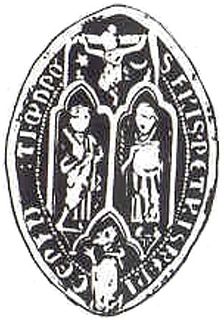Related Research Articles

Pope Alexander IV was head of the Catholic Church and ruler of the Papal States from 12 December 1254 to his death in 1261.

William of Ockham was an English Franciscan friar, scholastic philosopher, and theologian, who is believed to have been born in Ockham, a small village in Surrey. He is considered to be one of the major figures of medieval thought and was at the centre of the major intellectual and political controversies of the 14th century. He is commonly known for Occam's razor, the methodological principle that bears his name, and also produced significant works on logic, physics, and theology. William is remembered in the Church of England with a commemoration on 10 April.

Pope John XXII, born Jacques Duèze, was head of the Catholic Church from 7 August 1316 to his death in 1334.

Flavius Valerius Constantius "Chlorus", also called Constantius I, was a Roman emperor as one of the four original members of the "Tetrarchy" established by Diocletian in 293. He was a junior-ranking emperor, or Caesar, from 293 to 305, and senior emperor, Augustus, from 305 to 306. Constantius was also father of Constantine the Great, the first Christian emperor of Rome. The nickname Chlorus was first popularized by Byzantine-era historians and not used during the emperor's lifetime.
Conciliarism was a reform movement in the 14th-, 15th- and 16th-century Catholic Church which held that supreme authority in the Church resided with an ecumenical council, apart from, or even against, the pope.

Petrus de Dacia was a 13th-century Swedish monk of the Dominican Order. He was most noted for his correspondence with the mystic and ecstatic Christina von Stommeln. Though he wrote in Latin, Petrus de Dacia is often credited as the first author in Sweden.
Albert of Saxony was a German philosopher and mathematician known for his contributions to logic and physics. He was bishop of Halberstadt from 1366 until his death.

The Condemnations at the medieval University of Paris were enacted to restrict certain teachings as being heretical. These included a number of medieval theological teachings, but most importantly the physical treatises of Aristotle. The investigations of these teachings were conducted by the Bishops of Paris. The Condemnations of 1277 are traditionally linked to an investigation requested by Pope John XXI, although whether he actually supported drawing up a list of condemnations is unclear.

Richard Fleming, Bishop of Lincoln and founder of Lincoln College, Oxford, was born at Crofton in Yorkshire.
Nicholas of Autrecourt was a French medieval philosopher and Scholastic theologian.
Boetius de Dacia, OP was a 13th-century Danish philosopher.
Adam of Wodeham, OFM (1298–1358) was a philosopher and theologian. Currently, Wodeham is best known for having been a secretary of William Ockham and for his interpretations of John Duns Scotus. Despite this associational fame, Wodeham was an influential thinker who made valuable philosophical contributions during his life.
John of Mirecourt, also known as Monachus Albus, was a Cistercian scholastic philosopher of the fourteenth century, from Mirecourt, Lorraine. He was a follower of William of Ockham; he was censured by Pope Clement VI.
John of Montson was an Aragonese Dominican theologian and controversialist. His refusal to give up his beliefs regarding the Immaculate Conception resulted in his condemnation and clandestine exile to Spain.
Nicolas Cop, rector of the University of Paris in late 1533, from 10 October 1533, was a Swiss Protestant Reformer and friend of John Calvin. Nicolas Cop and his brother Michel Cop, sons of the king's physician, had become Calvin's friends during their shared time at the Collège de Montaigu. They were sons of Guillaume Cop, a native of Basel who became physician to the king of France, Francis I.
Thomas Waleys was a Dominican master of theology at Oxford University who delivered a sermon on the Beatific Vision in 1333. The sermon brought him into conflict with ecclesiastical authorities in Avignon. His idea that saints and purified souls would see God immediately after death was at odds with the position of Pope John XXII, who contended that God's essence would be revealed only after the Last Judgment.
John Lutterell was an English medieval philosopher, theologian, and university chancellor.
John of Calore was Chancellor of the University of Paris in the late 14th century. He was one of a number of theologians who was investigated for suspect teaching, based on statements he made during vespers. The inquiry concerning John of Calore, as a bachelor of theology, came in 1363. He was preceded as chancellor of the University of Paris by Grimerius Bonifacci.
Cardinal William Curti was an official of the Catholic Church who was involved in religious and academic censure at the University of Paris, in the late 14th century. He is best remembered as the cardinal who presided at the trial of Nicholas of Autrecourt. The trial concerned the suspect views of Nicholas of Autrecourt pertaining to the immortality of the soul.
Robert de Bardis was a 14th-century Chancellor of the University of Paris and a member of the Florentine Bardi banking family. He became chancellor of the Sorbonne in 1336. His financial resources placed him on the same level as the chancellor of Seville. de Bardis was a highly regarded scholar of St. Augustine and a friend of Petrarch.
References
- ↑ Censure and Heresy at the University of Paris, 1200 - 1400, J.M.M.H. Thijssen, University of Pennsylvania Press, 1998, pg. 70.
- ↑ Ockham and Ockhamism: Studies in the dissemination and impact of his thought, William J. Courtenay, Brill Publishers, 2008, pg. 173.
- ↑ Censure and Heresy at the University of Paris, pg. 71.
- ↑ The First Universities: Stadium generale and the origins of university education in Europe, Olaf Pedersen, Cambridge University Press, 1997, pg. 245.